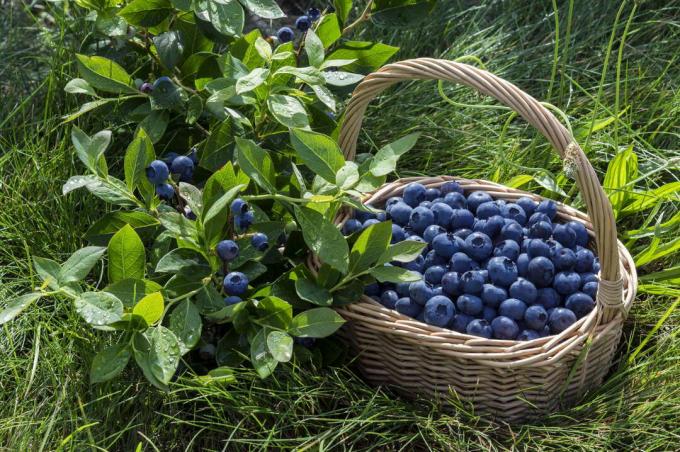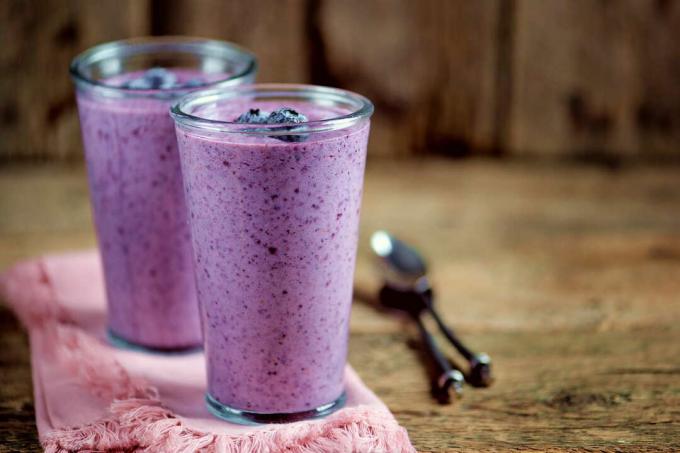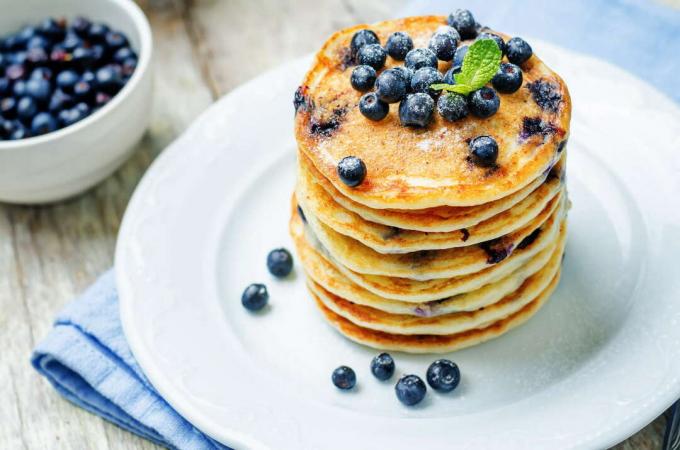Blueberries are so delicious that you want to enjoy them all year round. Learn how to properly harvest, store, and dry blueberries here.

Perhaps you still remember the blue fingers and mouths when harvesting succulents blueberries (Vaccinium) in sparse forests? Compared to the fruits of the forest blueberry (Vaccinium myrtillus) have newer breeds of cultivated blueberries (Vaccinium corymbosum) a light-colored flesh and therefore no longer color quite as strongly. The harvest of cultivars is also far more productive due to the larger fruits. If you want to pick the sweet blueberries yourself, you should definitely grow them in your own garden. We explain to you how best to go about picking the blueberries and which options for preserving them have proven themselves.
contents
- Picking blueberries/blueberries: when are they ripe?
- Harvest blueberries/blueberries correctly
-
Preserve and store blueberries/blueberries
- Dry blueberries
- Freeze blueberries
- Blueberries/Blueberries: Use in the kitchen
Picking blueberries/blueberries: when are they ripe?
Ripe blueberries can be recognized by the dark blue colored stalks. The fruit development of the blueberry takes about 70 to 100 days, depending on the variety. Due to the rapid ripening of the fruit, it has to be picked several times within a few weeks. The first harvest usually brings the largest berries. If you plant early and late varieties, you can even extend the blueberry season. This means you can harvest fresh blueberries from the beginning of July to September. Depending on the variety and stage of development of the plants, a total harvest of around 4 to 5 kg of berries per bush is possible.
Harvest blueberries/blueberries correctly
Blueberries should be harvested when they are fully ripe, because only then do they develop their full aroma. Ripe fruit should be easy to detach from the stem. Roll each berry off the grape with your thumb and catch it in your open hand. Then you can collect the berries in a bowl. These are very sensitive to pressure, so it's best to divide your harvest into several collection vessels to avoid squeezing them too much.
Tip: The juice of forest blueberries stains particularly strongly. However, the black color on lips and teeth can be easily removed with lemon juice.

Preserve and store blueberries/blueberries
Blueberries only last about a week in the fridge. It is best to put the freshly harvested blueberries in a sealable container and only wash them immediately before consumption. In addition, you should definitely sort out berries with bruises and mold to avoid spoiling the other fruits. Because of their thicker skin, cultivated garden blueberries last a little longer than wild forest blueberries. However, if you want to have some of your harvest longer term, you should consider how to preserve the healthy blueberries. In addition to juicing, drying and freezing have proven to be particularly useful for preserving blueberries.
Dry blueberries
In principle, you can spread out the blueberries and air dry them, provided it is warm enough and there is enough air exchange. However, drying is particularly quick and effective in the dehydrator or in the oven. You can dry fully ripe fruit in the oven at 50 °C circulating air. The berries would dry faster at higher temperatures, but many vitamins would also be lost. Also, make sure the moisture can escape by sticking a wooden spoon in the oven door. Depending on the method, the drying process can take a few hours to several days. It is best to store the completely dried blueberries in airtight jars.
Freeze blueberries
Blueberries should be frozen as soon as possible after harvest. If this is not possible, the berries can also be stored in the fridge for a few days, but they should still be firm for freezing. Wash the fresh berries briefly, drain well and dry on kitchen paper. In order to be able to portion the blueberries later, it is advisable to pre-freeze the berries. To do this, they are spread out on a baking sheet or plate and placed in the freezer for a few hours so that they do not stick together. In order to keep them as space-saving as possible, you should later transfer the frozen blueberries to freezer bags or plastic containers. When frozen, blueberries can be kept for up to a year and can therefore be processed little by little.

Blueberries/Blueberries: Use in the kitchen
Blueberries are not called the local “superfood” for nothing. The healthy blueberries are rich in vitamin C, iron, calcium and potassium. They also contain antioxidant polyphenols and digestive fibers. In addition to being enjoyed fresh, the fresh berries can be processed well in dairy products (milk, yoghurt, quark) to make shakes and desserts.
Dried blueberries can be added to your breakfast cereal or tea mix. You can process fresh or already frozen blueberries into compote or juice. In combination with other fruits – such as strawberries (Fragaria) – you can also make sweet jams. In contrast to raspberry (Rubus idaeus) or blackberry (Rubus fruticosus) the blueberry also only has very small seeds, which are often perceived as not very annoying when chewing. It is therefore not necessary to pit the fruit before processing.
Friends of sweet dessert cuisine can use the blue fruits to bake delicious blueberry cakes (small pancakes), cakes or tarts. The American blueberry muffins, which are also available in many coffee shops, are particularly popular. If you prefer something with a higher percentage, you can of course also process the blueberries into fruit wine, liqueur or brandy.

In case you have some special blueberry varieties to grow and harvest, be sure to check out our dedicated variety article.

